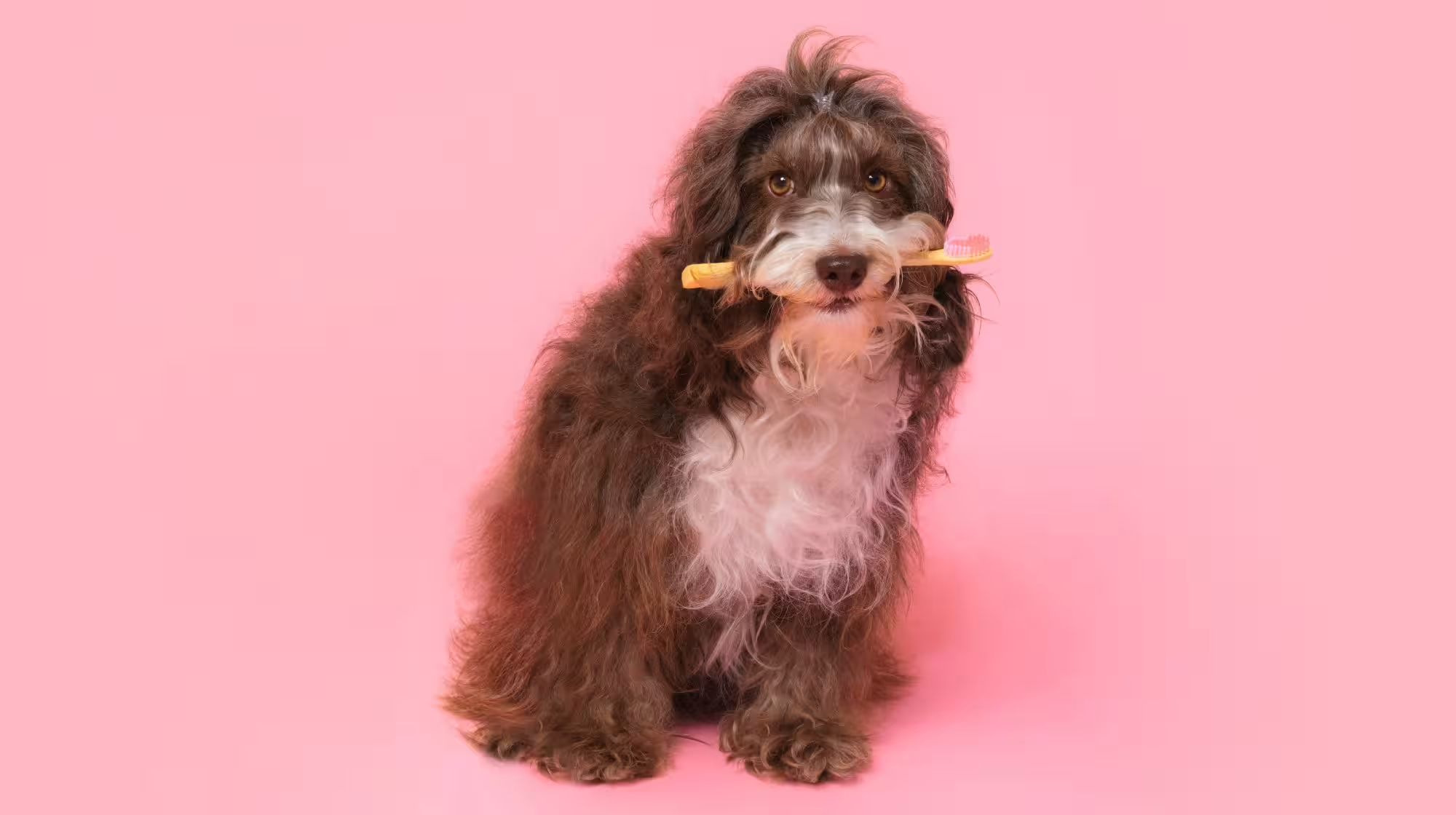We love to see our dogs smiling broadly, mouths open… but dodgy dog breath can really hit when you’re caught in the line of fire. Dogs aren’t exactly known for having breath that smells of summer fruits, but it shouldn’t be bad enough to make you wince - in fact, it should smell quite neutral. If it isn’t, there could be an underlying problem.
If you are somewhat struggling to look lovingly into your dog’s face lately, read on to learn why your dog’s breath smells so bad and steps you can take to remedy it.
Why does my dog’s breath smell?
Your dog’s breath doesn’t smell good - so what could be the problem? There are plenty of potential reasons why your pooch’s mouth has become a no-go zone, as listed below. The important things to note are whether it’s a temporary or ongoing problem, and whether other symptoms are occurring alongside it.
They’ve eaten something smelly We’re sure you’ve noticed by now that dogs will eat almost anything, from fish to dead birds, to whatever a fox has left behind in a muddy field. If their breath has an erroneous pong that doesn’t last, they may have eaten something nasty.
There’s something stuck in their teeth Look out for any meat or bones stuck in your pooch’s teeth, if you can - over a couple of days that will start to whiff, not to mention cause them discomfort.
Gum disease/periodontal disease Periodontal disease is caused and worsened by bad oral hygiene; periodontal bacteria grows in the mouth and over time can lead to cavities, infection, erosion of the gums and jaw, and tooth loss. This sounds serious but is actually extremely common - 80% of dogs will have periodontal disease by the time they reach three years old, even without showing any signs - but that doesn’t mean it should be ignored. When symptoms manifest, that means the condition is in its advanced stages. They include bloody or excess saliva, browning or yellowing teeth, swollen or red gums, and bad breath.
Hidden illnesses Bad breath can be a sign of something not quite right going on in your dog’s body. Illnesses such as diabetes, kidney disease and liver disease can have bad breath as a symptom, usually alongside other indicators such as vomiting, diarrhoea, a loss of appetite and your pooch not acting like their usual self.
A mouth tumour Hopefully a rare scenario, but a tumour or infection somewhere in your dog’s mouth is likely to smell not quite right. Take your dog to a vet immediately if you notice this, or if your pooch is displaying other signs of being unwell.
Imbalanced gut bacteria Just like a human’s, a dog’s gut microbiome functions best when balanced with just the right amount of ‘friendly’ bacteria. A diet that doesn’t nourish your dog or is packed full of fatty or sugary foods, additives or filler ingredients could upset your dog’s delicate gut microbiome - and their rancid breath will certainly give it away. The best and easiest way to explore your dog's gut health and balance of their gut microbiome is through a Gut Health Test. An easy, at home kit, it simple requires sending a sample of your dog's poop off to our labs, and we'll do the rest! What you'll then receive is a comprehensive Gut Health Test report, which not only gives insight into the health of your dog's gut, but also the exact supplements they need to feel their best.


Gut Health Test
Get your results in 4 weeks, with our quick and easy, at-home Gut Health Test for dogs. One simple poo sample, analysed by our microbiologists, and you’ll get personalised recommendations to help your dog thrive.
*This item is excluded from all discount codes.
-
Science backed gut health insights
-
Online report including key health indicators
-
81% saw an improvement in their dog's health
Current price: £69.99
Gut Health Test
Their breed is prone to bad breath Sadly lots of dogs are susceptible to oral concerns, in some cases due to the size or shape of their mouth and snout. Smaller dogs and older dogs in particular are more likely to suffer from less-than-fresh dog breath.
Inadequate oral hygiene If your dog doesn’t have anything resembling a toothbrush or dental sticks for dogs ever pass their stinky chops, bad breath could be a warning sign that their oral hygiene needs attention. As mentioned above, not cleaning your pooch’s teeth can lead to worsening symptoms of periodontal disease.

What is puppy breath?
Amongst the dog owner community, it's common to hear people sharing their love for the sweet smell of puppy breath. ...Still with us? For new or puppy owners to be, you might think we're sounding a bit weird, but trust us, there is a science behind it! There are a few reasons why puppy breath might smell so great to us, and they include:
Their diet. For young puppies still feeding on their mother's milk, their breath will be without the smell of all the fresh meats and treats they'll get to enjoy as they get older, giving their breath a sweeter smell. Plus, puppy food will have more of a simple and plain ingredient list to align with their sensitive tums, which won't cause as much of a pong on their breath.
Their teeth. As developing puppies eat to regain all the energy they've quickly burnt off, their mouth is working overtime to fight all the bacteria that otherwise would settle on their teeth. This reduces as they grow into adult dogs and get their forever teeth. Also, since puppies have all their fresh, new baby teeth - they're squeaky clean and won't be contributing to any bad smells!
Their cuteness. Let's face it, who can concentrate on anything ELSE when you have that tiny little face staring back at you? With everything that's going on, as well as the pheromones pouring out of that little pup, you as the puppy owner will be feeling a lot happier, more relaxed and probably won't even notice if your puppy's breath does have a subtle stink.
Why does my puppy's breath smell bad?
However, when it comes to puppy breath, it might not always be a basket of roses. If you're smelling something rather unpleasant on your puppy's breath, it might be an indication of something else. This might include eating something they shouldn't during their inquisitive exploring, eating their poop or being sick. Bad breath in puppies, and older dogs, can also be a sign of an underlying health condition.
Is bad breath in dogs a sign of illness?
It can be, but it could just as easily be any of the everyday factors listed above. To be sure there isn’t anything going on beneath the surface, try to tackle your pooch’s pongy breath at home before assuming the worst.
However, if your dog’s bad breath is an ongoing issue, or they’re displaying other symptoms such as dodgy poops, vomiting, going off their food, difficulty breathing/coughing or a general sense of being under the weather, take them to the vet. They can give your dog a thorough check up in order to rule out anything more serious.

How to get rid of dog’s bad breath
If the less-than-fresh aromas coming from your dog’s mouth are tough to endure, don’t suffer alone! Here’s a few easy steps to improve their apparent halitosis:
Regularly brushing teeth
Manually brushing your dog’s teeth and gums with a toothbrush for dogs and toothpaste is the optimal solution to great oral health. However, it can be a real palaver getting your dog to sit still while having their teeth cleaned, which is why it’s important to get them used to the habit right from their puppy years. If it’s a bit late for that, attempt a tooth brushing session gently, even if you just manage a few seconds at a time. Your vet or groomer may be able to give you some tips for this.
Giving your dog something to chew
Chewing keeps your dog occupied but also helps break down the plaque on your dog’s teeth. Having lots of chew toys, a few chewy treats or healthy dental sticks for dogs are ideal for this. Dental sticks that contain mouth-freshening ingredients like mint or spirulina will give you and your dog something extra to smile about.
Dental Care
Support their oral hygiene with our Teeth & Gums range. Fresh, benefit-led ingredients help support gum health, reduce tartar build-up, and keep breath fresh - giving them something to smile about.
-

 from
fromCurrent price: £11.49
Dental Stick Bundle For Dogs -

 from
fromCurrent price: £3.99
Calming Dental Sticks For Dogs -

 from
fromCurrent price: £3.99
Peanut Butter Dental Sticks For Dogs -

 from
fromCurrent price: £15.99
Dental Powder For Dogs -

 from
fromCurrent price: £3.99
Spirulina & Mint Dental Sticks For Dogs -

 from
fromCurrent price: £3.99
Cheddar Cheese Dental Sticks For Dogs -

 from
fromCurrent price: £3.99
Dental Probiotic Meaty Treats -

 from
fromCurrent price: £4.99
Long-Lasting Fish Hide Chews -

 from
fromCurrent price: £4.99
Calming Fish Hide Chews -

 from
fromCurrent price: £9.50
Fish Chews Bundle
Check your dog’s teeth
Every week or so, have a look in your dog’s mouth and gently check their teeth and gums with a clean finger. If there are receding gums, redness, swelling or bleeding, it’s probably time to book a dentist appointment.
Visit the dentist
A dentist for dogs or vet will have the best advice on your dog’s specific oral health issues, and can provide you with any medicine or treatment you might not have been able to get on your own. Book in regular check-ups so your dog’s mouth health is always up to scratch.
Think about their diet
Inside a dog’s body there are all sorts of processes going on, many of which are smelly. If your dog has a food allergy or isn’t responding very well to the food they eat, this could manifest as bad breath. Feeding them a rounded diet full of whole ingredients, lean proteins, vegetables and fruit, as well as healthy supplements such as probiotics, will improve conditions in their gut - and hopefully make their nearby panting sessions a much more pleasant experience.


Dental Powder For Dogs
A complementary dental powder for dogs, made from 100% Dried Sea Kelp to clean teeth, keep gums healthy, and freshen bad breath.
-
Protects teeth & gums
-
Puppy-friendly
-
100% Sea Kelp
Current price: £15.99
Dental Powder For Dogs
Ready to get to work on your dog’s teeth? Our tasty range of healthy dental treats for dogs will help keep your pooch’s teeth and gums clean - and their breath fresh! To talk more about your dog’s oral care, feel free to get in touch with us.




